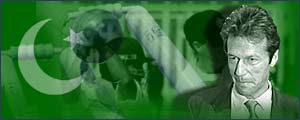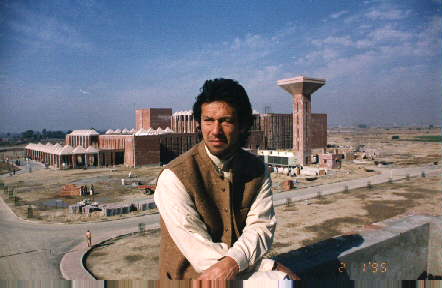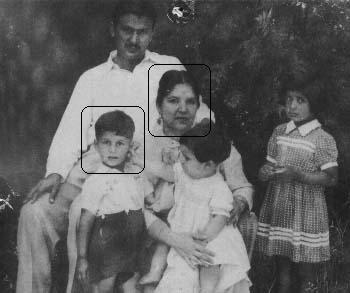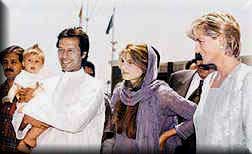
This page has movedhere
IMRAN KHAN- life time achievements

IMRAN KHAN- life time achievements
Some people in this world are destined for greatness, Imran Khan is surely one of them. No celebrity or sportstar in Pakistan has ever enjoyed so much fame and respect as Imran Khan, former Pakistan cricket captain and leader of the political party Pakistan Tehrik-e-Insaaf. Imran Khan is responsible for bringing about significant changes in both the cricket and political structure in Pakistan. Imran was a fine all-round cricketer and inspirational captain whose crowning achievement was leading Pakistan in winning the 1992 World Cup. He is also responsible for setting up the first ever cancer hospital in Pakistan which provides free treatment .

Imran Khan was born on the fifth of November 1952 in Lahore. His father, Ikramullah Khan Niazi was an engineer by profession. His family was most accurately described as upper-middle class, and comfortably off rather than rich. Eight of Imran's numerous cousins who grew up in his home suburb of Lahore, Zaman Park, became first class cricketers. Among them are Javed Burki and Majid Khan, both of whom preceded Imran in going to Oxford and captaining Pakistan. Imran started playing cricket at the age of thirteen and was inspired by his cousins . He completed school in Lahore and then moved on to England for higher studies at Oxford. He completed his education at Oxford. He initially played cricket for his college and later represented the English county Worcester at the first class level. He made his debut for Pakistan during the 1972 England series when he was eighteen and then went on to become a major force in world cricket.

Imran Khan was a fine fast bowler and inspirational captain whose crowning achievement was leading Pakistan in winning the 1992 World Cup. A genuine all-rounder he consistently made useful contributions with the bat in all forms of cricket. Imran was also a bowler capable of producing enormous swing due to his somewhat unique action. He could also produce deadly bouncers, which terrorized batsmen all over the world. As a fast bowler Imran traded bouncer for bouncer with particularly the West Indians and any side that he felt had a weakness against short-pitched bowling. In the mid-70s, a bouncer from Andy Roberts, a tailender to whom Imran had bowled too many bouncers, almost killed him. It is often said that fast bowlers hunt in pairs. Imran had developed a patnership with Sarfaraz Nawaz in his early days and then combined with Wasim Akram and Waqar Younis to take Pakistan to the top. A determined and committed individual, Imran bowled fast up until his retirement at the age of 39, an exceptionally long career for a fast bowler. Imran Khan is still the highest wicket taker for Pakistan in Test matches with a career haul of 362 wickets.
Imran Khan was a batsman with a tremendous hard-hitting ability. He would often come in to bat in the slog overs and would increase the run-rate with the help of some aggressive batting. Imran had a liking for the slow bowlers and was particularly severe on the spinners, often hitting them out of the ground for sixes. He was a stylish hard-hitting batsman generally orthodox in his approach, but an effective improviser when conditions demanded . His most memorable batting performance was in the final of the World Cup when he scored 73 valuable runs against a strong English attack. For a bowler to take 362 wickets and then to score runs at an average of 37.69, add to that the burden of captaincy, is just a remarkable achievement .
Imran Khan is regarded as the greatest all-rounder cricket has ever produced. From the late 70s to the early 90s, four all-rounders bulked large on the international cricket scene. Imran Khan, Ian Botham, Kapil Dev and Richard Hadlee vied, during all that time, for the title of 'the world's finest all-rounder'. Statistically their achievements are remarkable. The four are the only players to have achieved the 'triple double', which is 3000 runs and 300 wickets in Test cricket. They were all exciting match-dominating figures, and each played decisive hands to win tests for his country. By examining their career averages, it should be recognized that Imran had the best career batting average of the four as far as Test cricket is concerned, while his bowling average was second to Richard Hadlee's by only a very small margin. And when the four all-rounders are compared with each other generally, Imran comes out the best of all. And this is an assessment with which at least one of Imran's rivals, Richard Hadlee, agrees. In his 1989 book, Rhythm and Swing, the New Zealander confidently tags him: The Best of the Age
.
Following a revolt by some of the senior members in the team, Imran was made captain for the tour of England in 1982. As a sportsman, Imran is best remembered primarily for his leadership. Pakistan has long been one of the most troublesome sides to captain. But Pakistan got the just the right captain in Imran. Gradually during his term, Imran became the most influential figure in Pakistan's cricket setup. His success as captain owed largely to his own match-winning performances. When Pakistan started off badly at the 1992 World Cup and at a stage were completely out of contention for the title, Imran told his players to fight like 'cornered tigers' and they did. Imran led Pakistan to a well-deserved World Cup victory at Melbourne. This was surely Imran's greatest moment as a cricketer. Imran oversaw Pakistan's emergence and maturing as a force in world cricket and was responsible for the nurturing of the next generation of Pakistani players most notably Saeed Anwar, Wasim Akram, Waqar Younis and Inzamam-Ul-Haq. Imran is the most successful Pakistani Captain to date .
Imran was victimized by a shoulder injury throughout his career which had prompted him to retire in 1988. But he came out of retirement for a number of reasons. The most important reason, which lured Imran out of retirement, was the cancer hospital appeal. The appeal evidently needed him to remain in the public eye. But the very apex of Pakistan's autocratic society provided the impetus for him to return. The State President, General Zia-Ul-Haq, himself. It was at a dinner, hosted by the President in honor of the side's successes in India and England that the President made his public appeal to Imran to make a return to cricket. "After presenting the players with gold medals, he praised Imran's decision to retire while at his peak, but added: 'A sportsman is like a soldier who is always ready to help his country'. Imran was left with little choice than to respond: ' I am always ready to serve the nation and the game.' "
In September 1992, shortly before his fortieth birthday, Imran announced his retirement from all cricket. Imran had taken six months to take the decision. The reason for taking the time was that he wanted to be doubly sure of retirement to avoid facing the embarrassment of a second comeback. The most painful decision that he took as captain was to drop his cousin, Majid Khan, who was also his childhood hero. His most satisfying moments were beating India in India, Pakistan's performances against the West Indies in 1988 and winning the World Cup. The lowest point was when, after taking 87 wickets in 18 Tests, he developed his stress fracture. He singles out Viv Richards and Sunil Gavaskar as the best batsman of his time, Michael Holding as the fastest and Ian Chapel as the finest captain. Imran's criterion was value to the side in time of need rather than skill alone.
Statistically Imran's achievements were remarkable both as a batsman and a bowler. He is one of the only four cricketers to have achieved the feat of scoring 3000 runs and 300 wickets in Test cricket. Imran Khan played 88 Test matches for Pakistan and scored 3807 runs at an average of 37.69, he also took 362 wickets. And in 175 one-day internationals he has scored 3709 runs at an average of 33.41 and has taken 182 wickets. Imran led Pakistan in 47 Test matches and 139 one-day internationals with 14 Test match victories and 75 one-day international victories, which makes him the most successful Pakistani Captain to date .
Imran Khan had always been very close to his mother and had enjoyed her support. In 1984, Imran's mother, Shaukat Khanum became ill to such an extent that once properly diagnosed, she was almost inoperable. She suffered from cancer, which was known to be a rich man's disease in Pakistan in that only well off people could afford to fly to Europe to receive the treatment. Inspite of flying to Cromwell Hospital in 1984, Shaukat Khanum died the following year in acute pain. Imran was by her side during her last days when she suffered terribly. He felt her pain but could not do anything for her. Imran's career was thus determined. When he retired from cricket he would build the first cancer hospital in Pakistan in honor of his mother.
His mother's death and his own serious injury made Imran appreciate just how precarious was the existence he had taken for granted. He was at his peak as a cricketer only to be told that he would not play again. His mother, a constantly reassuring presence in his life, suddenly was dying. He reassured his values and sense of direction. His visits to hospitals in Pakistan where he would see three or four children suffering from cancer having to share a bed and uneducated people unable to afford basic medicine, made him appreciate how desperately the poor needed specialist cancer treatment. He then vowed to raise five million pounds to build and equip a hospital in Lahore, his home city.
Since Imran retired in 1992, his study of the Quran has supplanted his assimilation of cricket. He prays everyday and punctuates his conversation with quotations from the Quran, which he feels, encompasses the wisdom of the Bible and Torah and is a practical guide to life. His belief in fate that his life was being shaped for him strengthened his faith, which had wavered after his mother's death. He had long believed in adhering to the guidelines of the Quran as he was best able to do. It was not practical for him to attempt to pray five times a day when he was playing cricket but he would say prayers every morning on a mat facing Mecca when his belief in God had returned. His study of the Quran satisfied a desire for knowledge that could no longer be stated by textbooks of cricket. Imran's sudden awakening to the realities of life did not happen overnight. Watching his mother, die slowly of cancer made him stop and see where his life was going. He explains that it was a gradual awakening over a number of years . Imran became submissive to what he saw as the will of God. His fundraising and his faith were interfluent, although he would not improve either on anyone else.

During Imran's cricketing days the likelihood was that he would not marry. Though he dated a string of glamorous women in London. Imran said that by not marrying he was being saved for something that should not be constrained by marriage. As the years went by, an arranged marriage became increasingly improbable in Pakistan as most girls were married at a very young age. It surprised and shocked his friends and countrymen when Imran announced his marriage with Jemima Goldsmith, the 21-year-old daughter of British tycoon, Sir James Goldsmith. Imran married Jemima Goldsmith in a Muslim ceremony on May 16th 1995 in Paris, France, then in a civil ceremony in Richmond on June 21st. Before Marriage Jemima converted to Islam and was renamed Haiqa. They live part of the year in Lahore, Jemima visiting London often. In June 1996, the couple announced that they were expecting their first child. Jemima gave birth to a baby boy, named Suleiman Isa on 18th November 1996, in London.
After deciding to set up a cancer hospital in memory of his mother, Imran Khan decided that he had to work extremely hard to succeed in his mission. Imran was forced to come out of retirement in 1988 because of the cancer hospital project. His friends and relatives insisted that he won't be able to achieve his goal without playing an active and significant role in cricket. He had vowed to raise five million pounds to build and equip the hospital in Lahore. Even though the Government of Pakistan donated twenty acres of land on the outskirts of Lahore, it was to become apparent that five million pounds would cover only the initial phase. When eventually the construction was complete and the equipments installed, the running costs would be such that Imran would be shackled to the project for the rest of his life. Inspite of knowing the difficulties he would have to face, Imran did not turn back.
The World Cup victory in 1992 went a long way in fulfilling Imran's dream project. Pakistan had to win the World Cup if Imran's appeal was not to collapse. Imran had worked very hard to win the Cup. In the run up to the World Cup Imran used to work out Pakistan's best side and the strengths and weakness of the others. On the journey home from Australia, Imran's team stopped at Singapore for a reception given by the Pakistani Ambassador. A cheque was handed over for money raised by the Asian community in that area. Imran had given his own prize money from the World Cup, 85,000 pounds, to the appeal. By the following year he had donated 200,000 pounds, the extra contribution coming from his shares at Wall Street. His was the single largest private donation. He had also invested in a supermarket in Lahore and pledged that a proportion of the profits would go to the appeal. It had taken more than two years to raise the first one and a half million pounds; in the six weeks immediately after the World Cup the same amount was raised.
After years of hard work and the collection of money worldwide, the time had come to turn Imran's dream project into reality. He had received tremendous support from the people of Pakistan who had always seen him as a hero. The Shaukat Khanum Cancer Hospital was inaugurated in December 1994. This project had meant to Imran more than anything in this world. Today the hospital runs on charity, without any assistance or aid from government organizations and with Imran being the largest contributor to the funds . Imran soon began to emerge as a public figure in Pakistan and began to face continuous problems and harassment at the hands of government officials. From leading the Pakistan team, to waging a personal crusade against cancer and the substandard education system in Pakistan, Imran always fought from the front and in the process won million of hearts. Even today thousands worship him and are playing an important role in ensuring the smooth functioning of the hospital in Lahore. The lively cricketer had been around the country giving fiery speeches like a politician rather than a former cricketer raising funds for his project. The politicians began to see him as their possible rival. Imran was banned from appearing on Pakistan Television for his call to raise money. He wasn't given free tickets by the national carrier of Pakistan, PIA, which other airlines offered . Imran began to see a conspiracy framed against him and felt the urgent need to reform the society.
After the success of Imran's hospital there was wide speculation from the media that Imran would soon be entering politics. Imran had never thought of entering politics during his cricketing days. General Zia-Ul-Haq, the late President of Pakistan and a close friend of Imran, had offered Imran a post in his government days before his death, but Imran had declined the offer. He had declined a further offer of a cabinet position in 1993 from Pakistan's interim government. After his experience of collecting funds, where he had direct interaction with the poorest and learnt of their grievances, Imran decided that there was the need for a revolution. Imran wanted to save Pakistan, which is one of the most corrupt nations in the world, from disaster. He wanted to serve the people who had given him fame and respect. He wanted to change the system for the better.
Imran Khan had no previous experience in politics except when he had accepted an unpaid position as Ambassador of Tourism during the 1993 interim government . At the time of his appointment there were riots in Pakistan, and the country was not a tourist destination. As Ambassador of Tourism, he planned to attend functions, to write books or documentaries promoting Pakistan and to bring out influential visitors two or three times a year. Imran truly believed that Pakistan had considerable potential. Although through his fame the hospital was a tourist attraction itself, Imran was aware that Pakistan would never attract mass tourism. He felt that Pakistan had bad publicity abroad because it was branded with Muslim fundamentalism and a military dictatorship that leads people to think of suppression. He also expressed that Pakistanis love tourists, but there was always this fear of Islam which was always portrayed as an evil religion.
In April 1996, Imran launched the Pakistan Tehrik-e-Insaaf, which was just a movement against the corrupt. In November 1996 Imran Khan, who had never voted in his life, joined politics and announced that his party would contest the general election due to be held in February 1997. The members of his party were mainly lawyers, doctors and other well-educated people who had no previous experience in politics . The main aim of his party was to fight the evil of corruption from society. He started campaigning for the elections and worked almost 18 hours a day. Imran's rivals started campaigning against him and indicated a Zionist hand behind his movement, as his father-in-law was a Jew. Furthermore, as a celebrity bachelor in London, Imran had affairs with A number of women, one of them, Sita White, claimed that Imran is the father of her four-year-old daughter. Imran has admitted the affair but says that he is not the father. This allegation proved to be a major setback to Imran's campaign, although the allegation wasn't proved.
The general elections in Pakistan were held on the 3rd of February 1997 in which Tehrik-e-Insaaf failed to win a single seat. His party, which was projected as a third force in Pakistan, was completely wiped out in the elections. Imran had contested from nine seats. In seven constituencies, he lost his security deposit by securing less than ten percent of the votes of the winning candidates. Imran said that a low turnout of voters was the main reason of his defeat. He also said that he got very little time to prepare for the elections as Tehrik-e-Insaaf was formed only four months before the elections. But Imran was successful in raising issues like corruption and accountability. There can be little doubt that the long and painful journey he undertook to turn his hospital project in reality was testimony to his social and humane commitment. He has been criticized for being over zealous about the project, he has been accused of exploiting his star status, his connections, and even the game itself for achieving his goal. I would like to know, if there is, another instance in human history where a single human being, a sportsman at that, who has staked his fame, fortune and future on such a humanitarian project.
Five hundred years of bloody tribal feuds merge in this deeply proud Pathan whose genes, more than the knowledge he assimilated in England, made him the cricketer he was. The red mists that clouded his eyes when he was hit for four made him only want to bowl the next ball faster because Pathans are an avenging race. Imran was always a controversial figure, always a man who gave rise to a hot debate on account of his strong conviction and hard line views. The bottom line was always the honesty, commitment and conviction with which he played cricket and it was by his conviction alone that he won over many to his point of view.
Now that you have reached till here, dont miss out on the following
Also plz visit the homepage of my dost Azfar.
And the homepage of another dost Shoaib,
Also, check out the websites of the following cricketers:
Salman Butt
Rashid Latif
Sohail Tanvir
click here to  me
me
This page has been visited times.